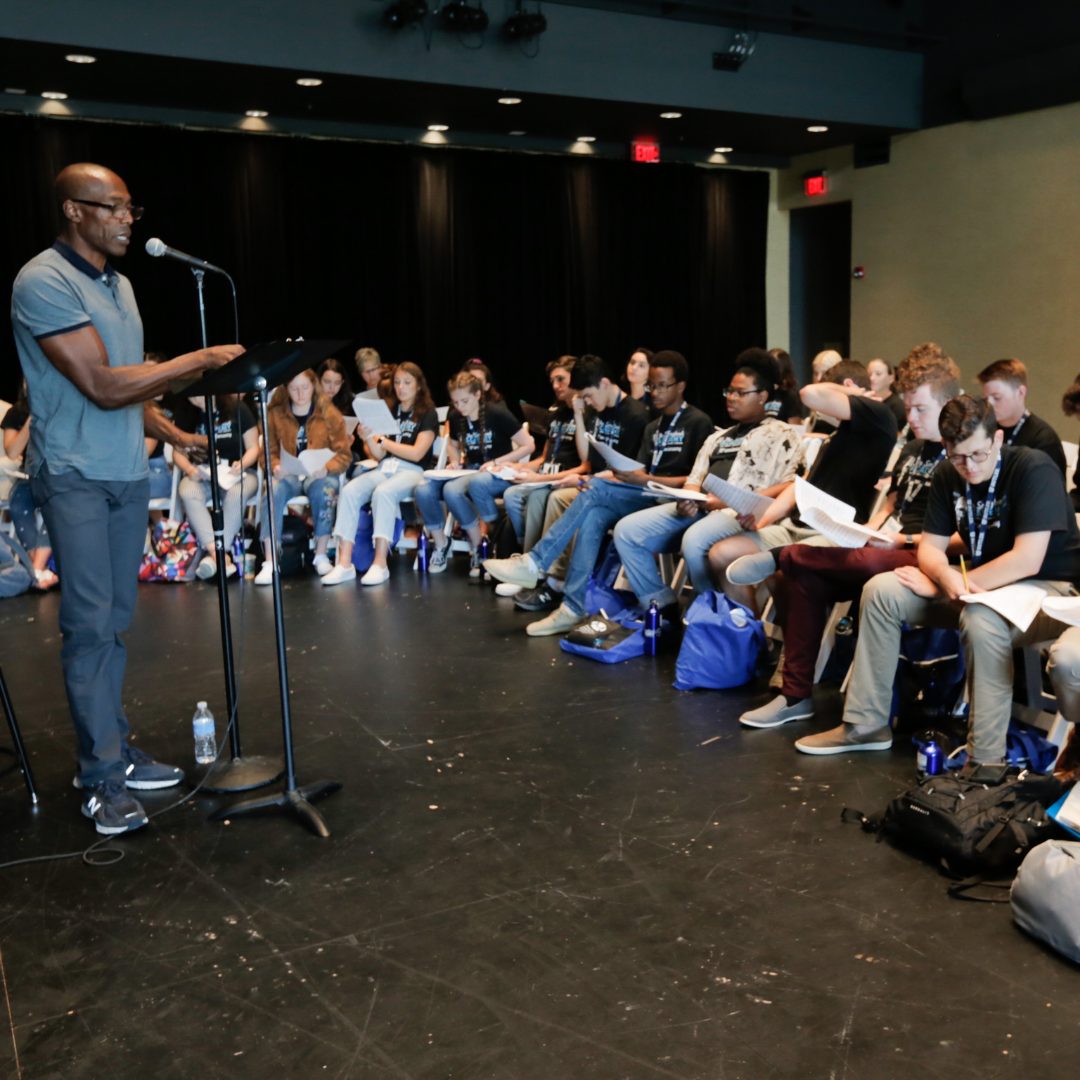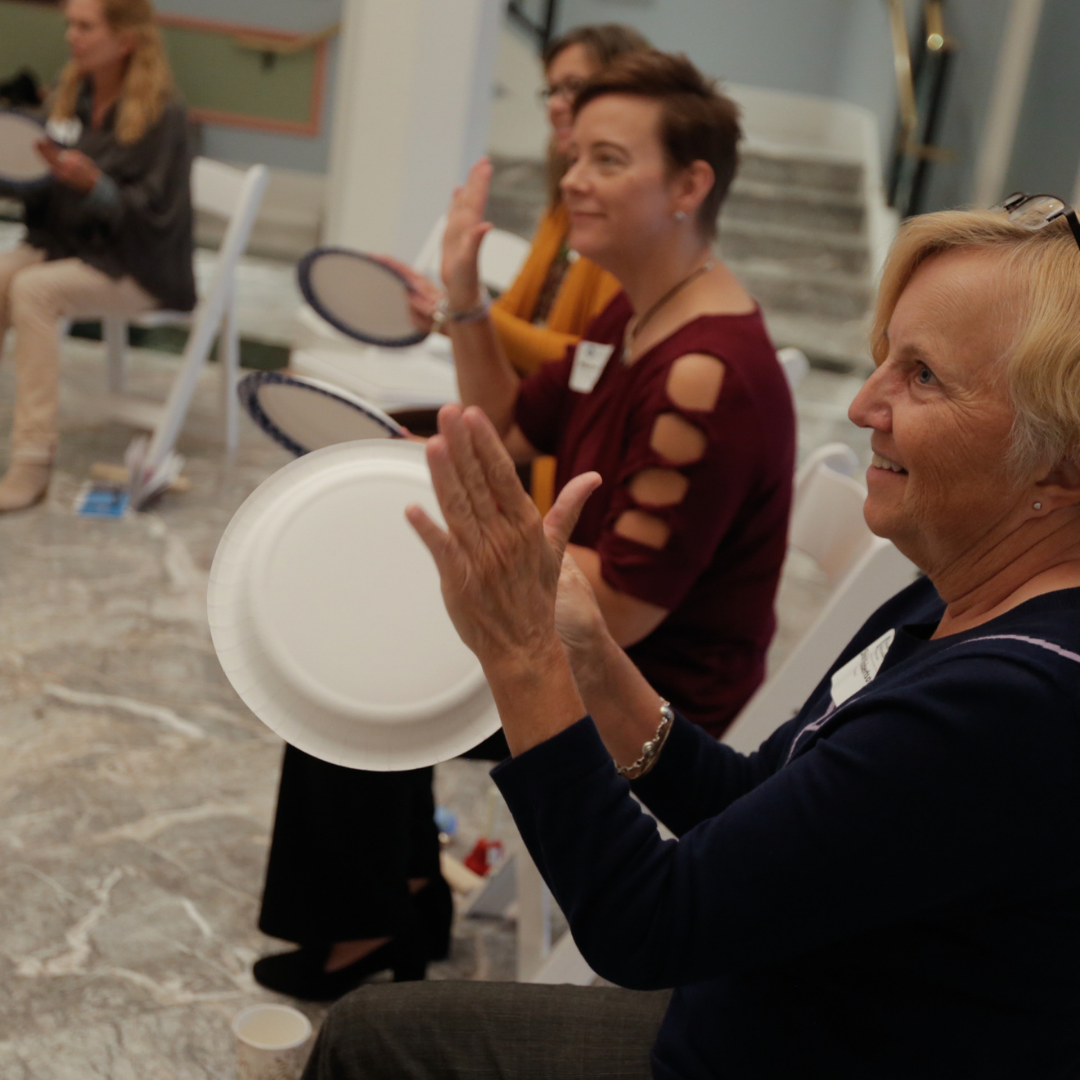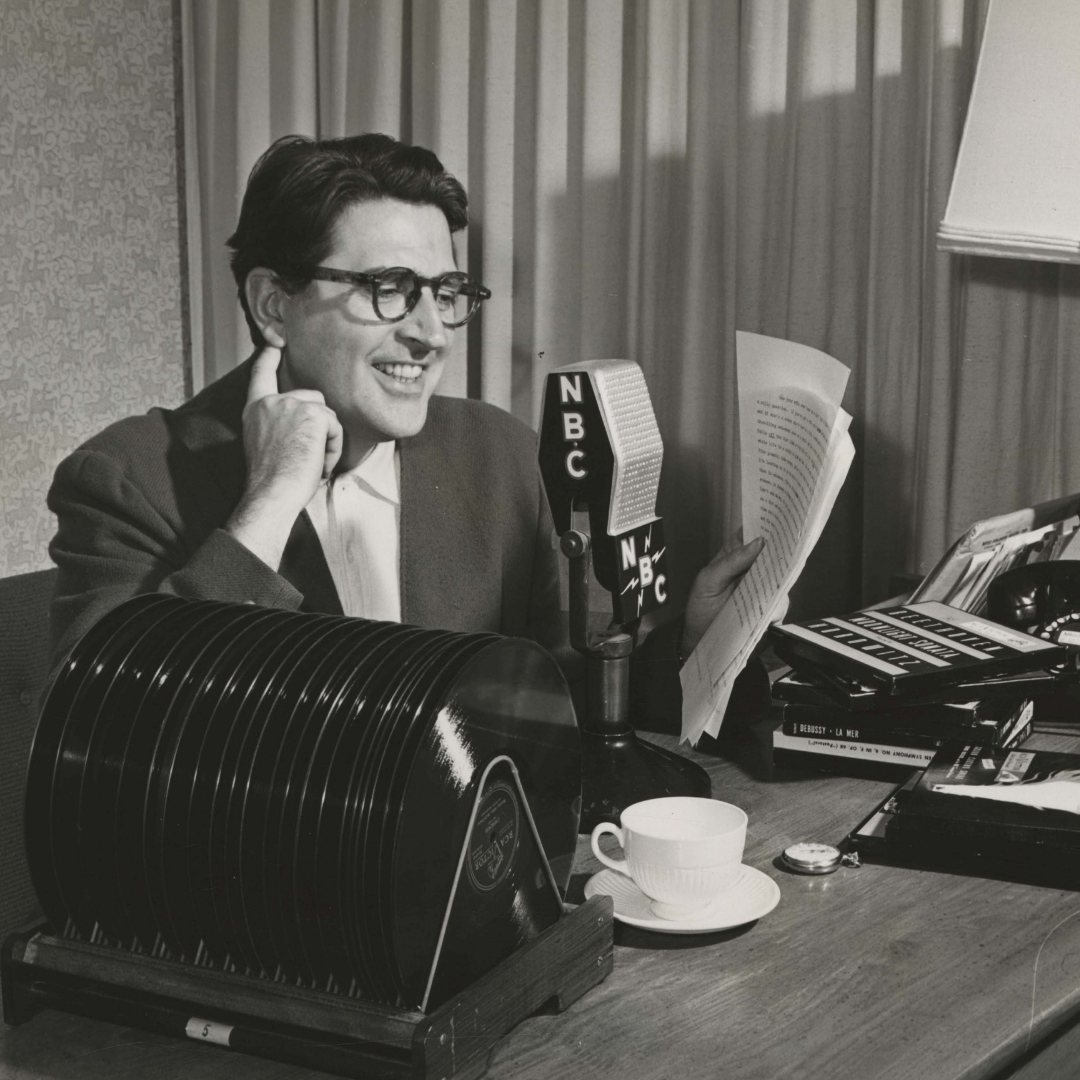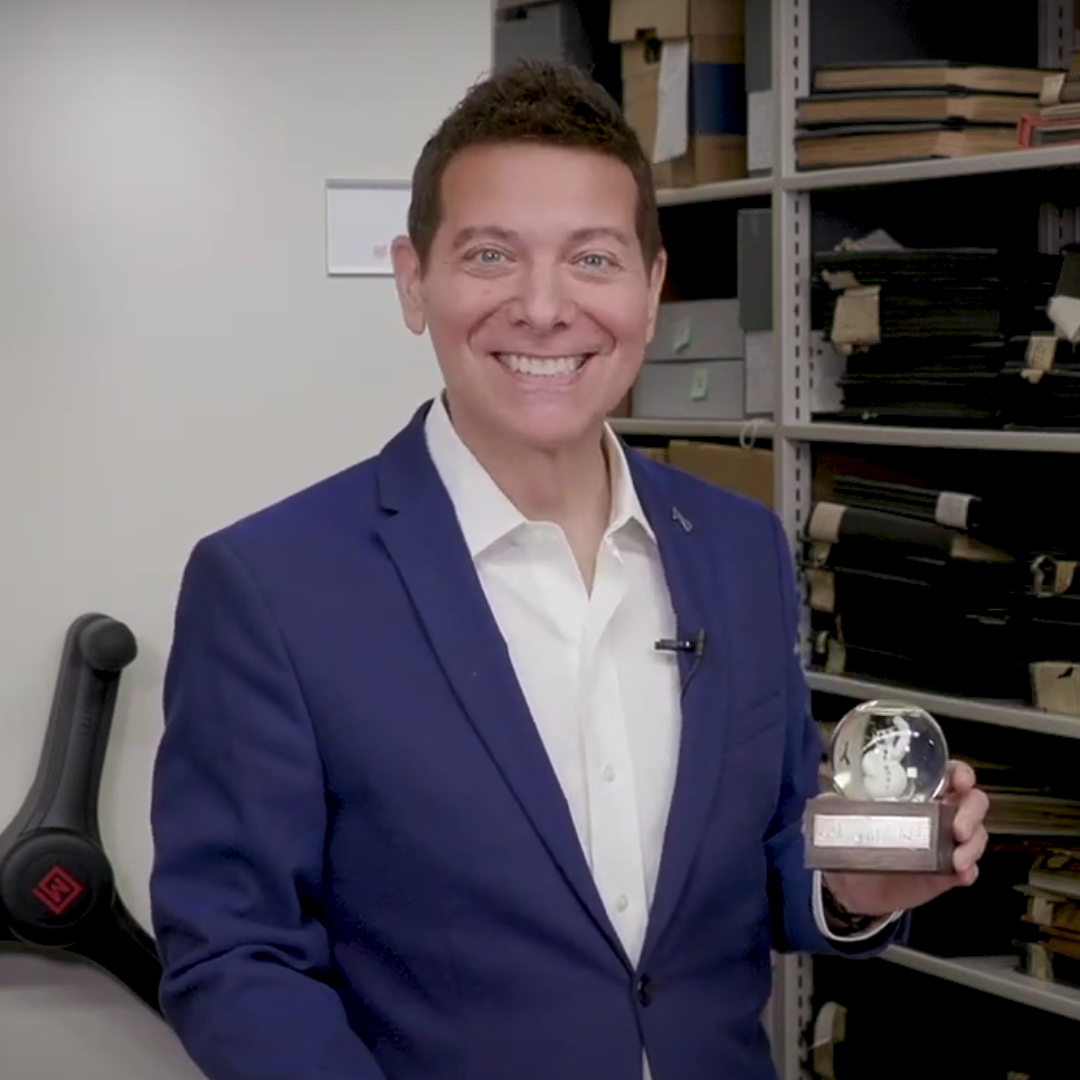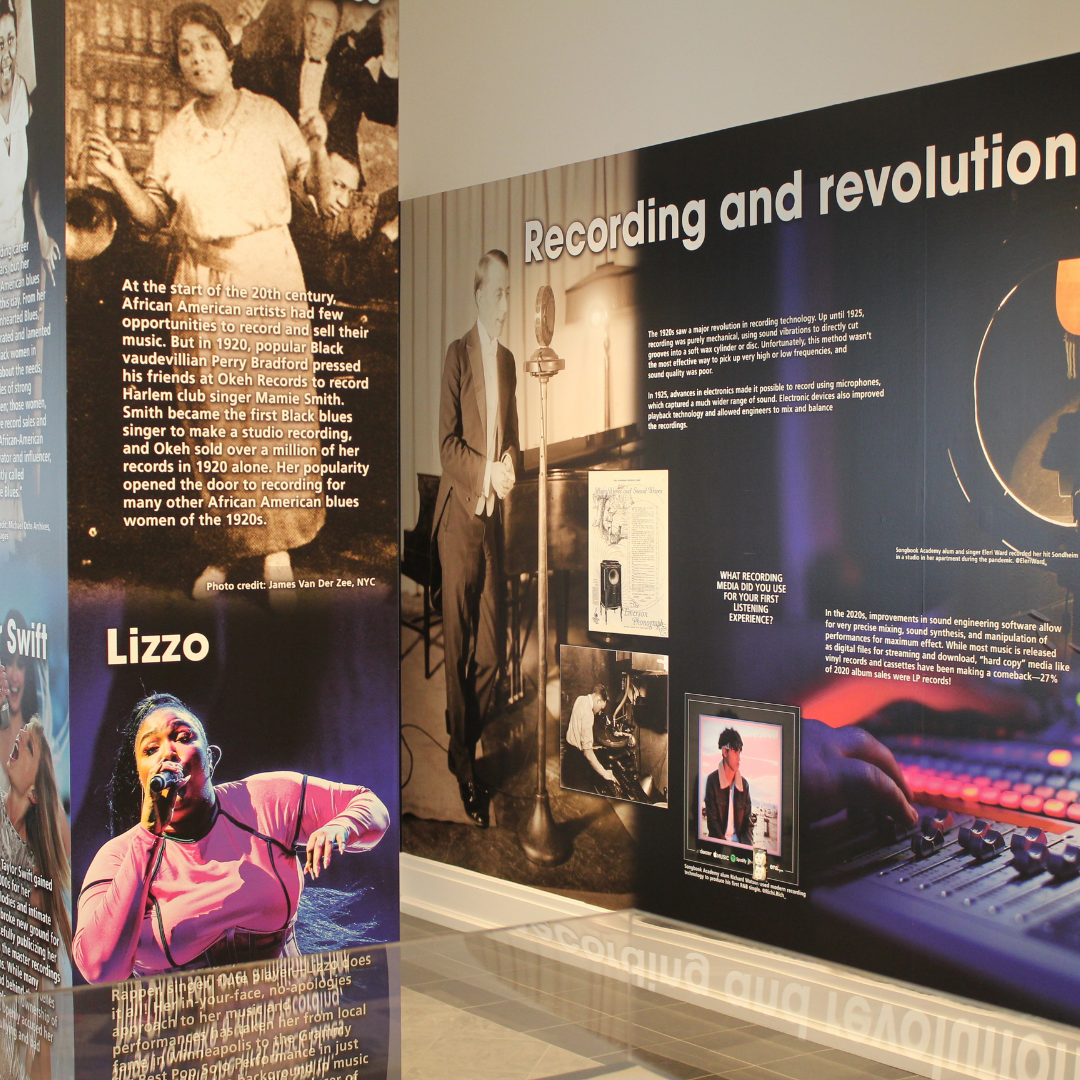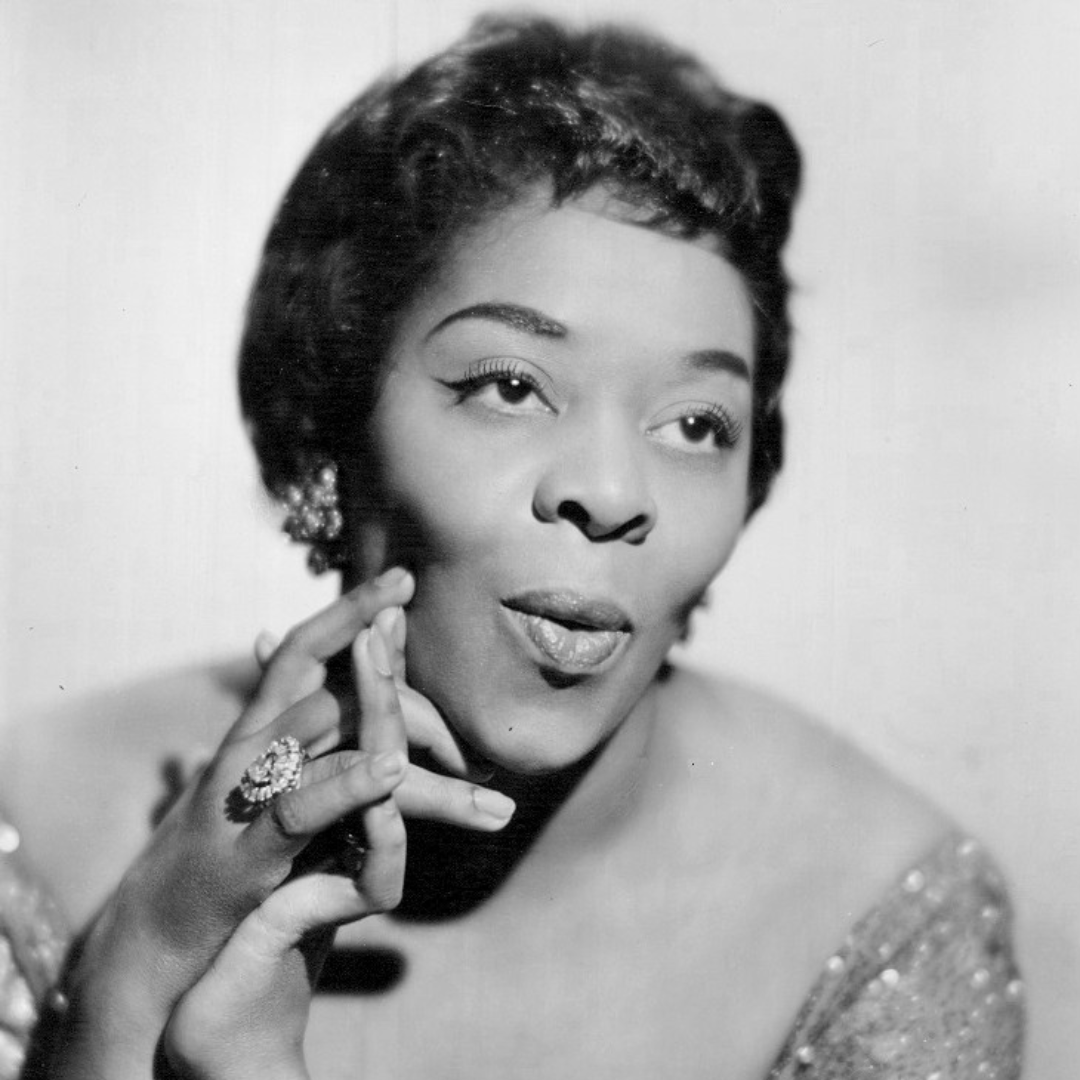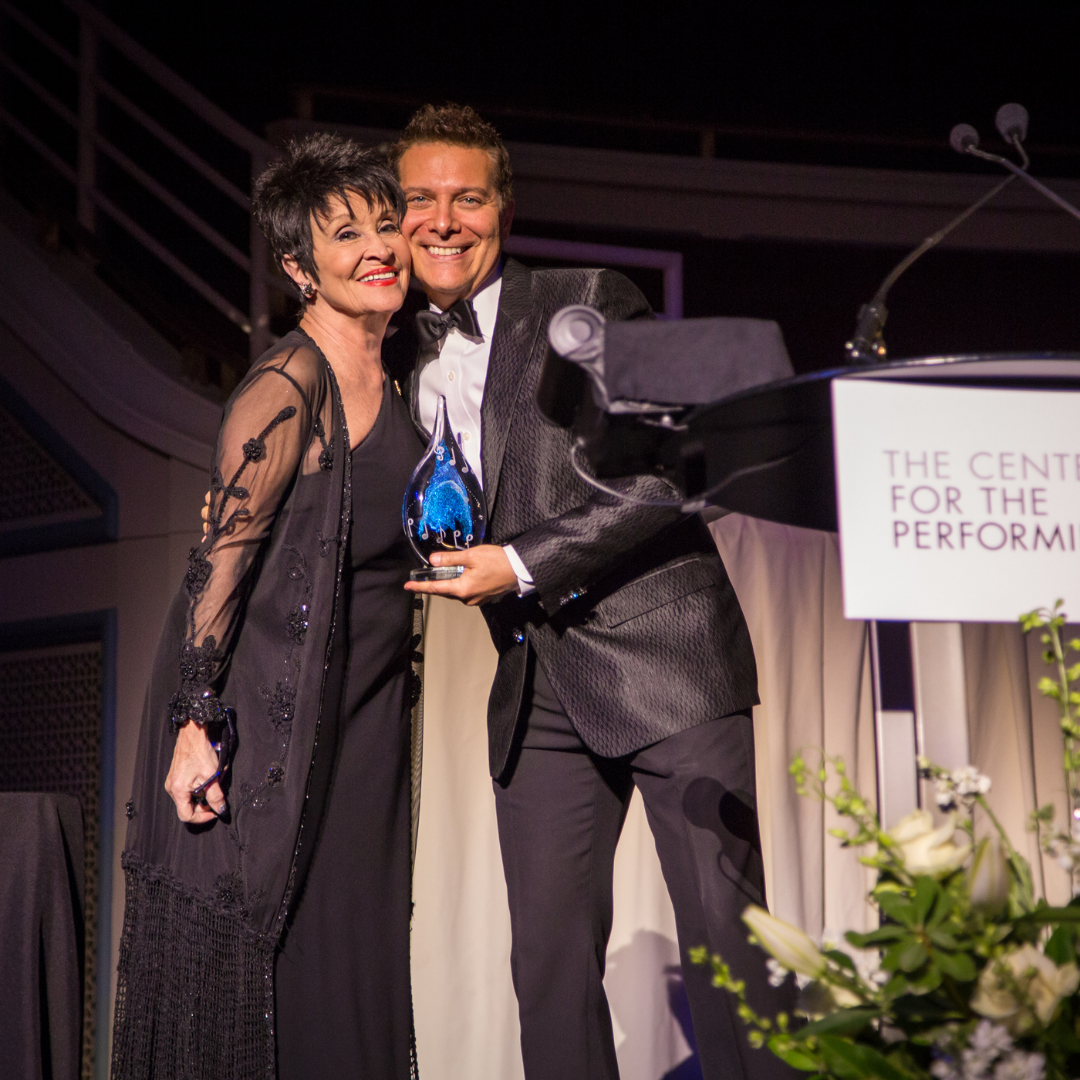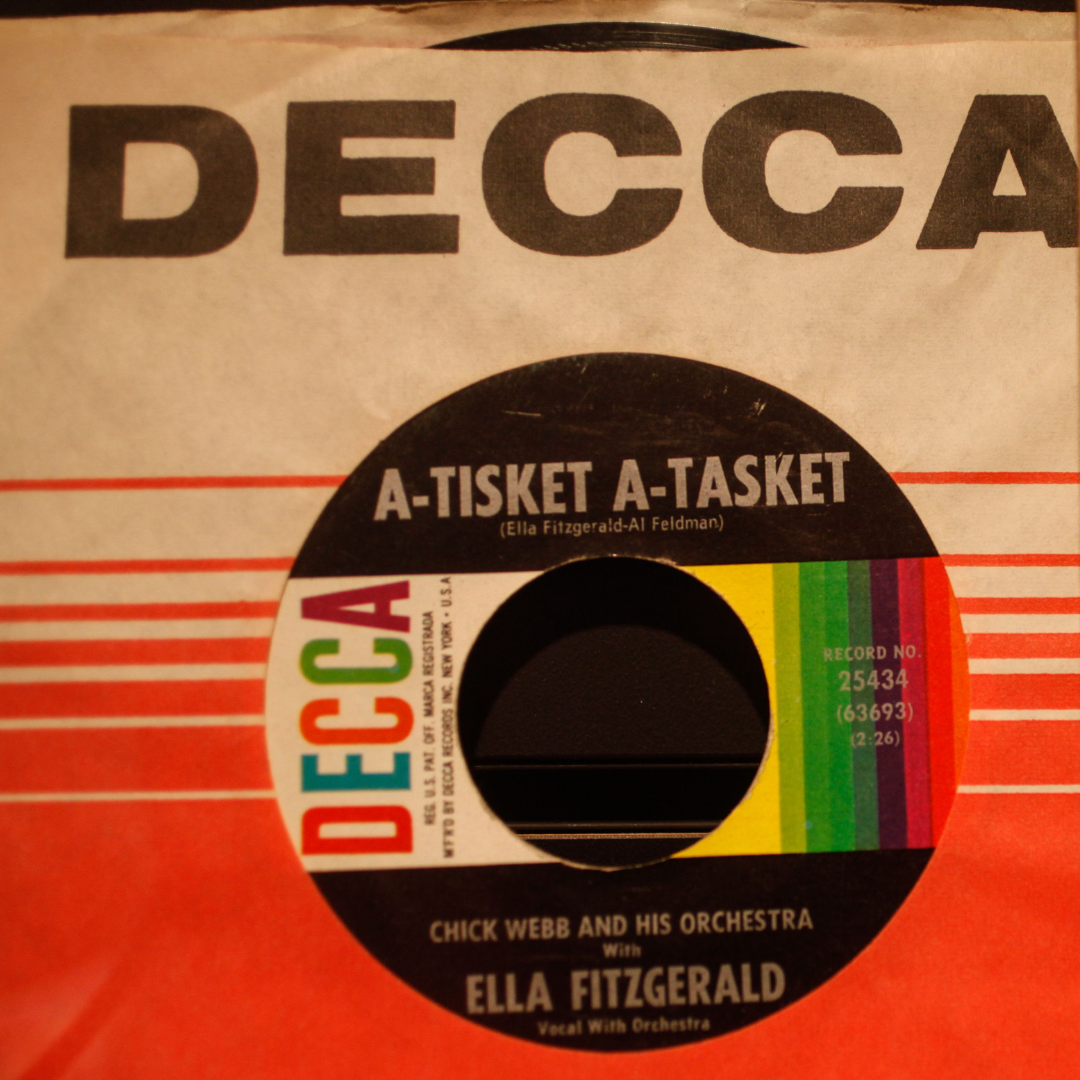A Change is Gonna Come: 1960s Broadway Musicals
January 27, 2021
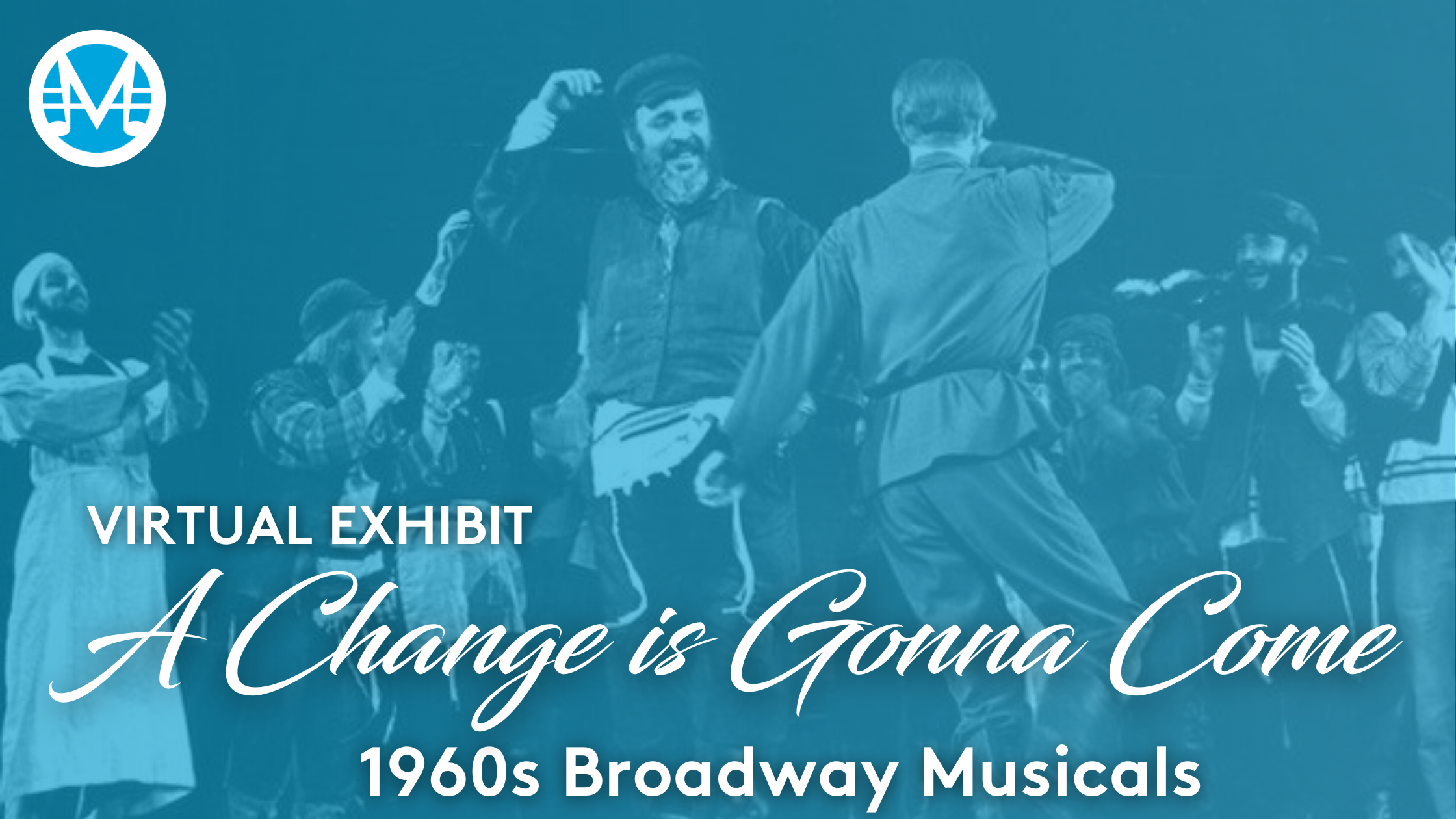
A Change is Gonna Come: 1960s Broadway Musicals

Recognized as one of the greatest decades of change in United States history, the 1960s began on a hopeful note with the election of John F. Kennedy. The assassination of the young, charismatic president three years later, however, tempered the nation’s optimism. The Civil Rights Movement, led by Dr. Martin Luther King, Jr., continued throughout the decade and experienced some great victories, such as the Civil Rights Act of 1964. Yet, by the mid-1960s, the Vietnam conflict had escalated into a full-scale war resulting in the institution of the “draft” by Congress. As the war stagnated and the body count increased, many college students radicalized by joining the “counterculture” movement, becoming activists, and demonstrating against the war, nuclear arms, and the status quo. The Sexual Revolution also arrived as women increased their efforts to achieve equality, aided by the introduction of “The Pill.” The “hippie” movement saw thousands of young men and women “check out” to practice “free love” and experiment with drugs. The 1968 assassinations of Dr. Martin Luther King, Jr. and Robert F. “Bobby” Kennedy, nationwide race riots, and the nightly barrage of war and death shown on television exacerbated the social and cultural divisions that had grown during the decade. The 1960s left Americans feeling deeply divided and disillusioned.
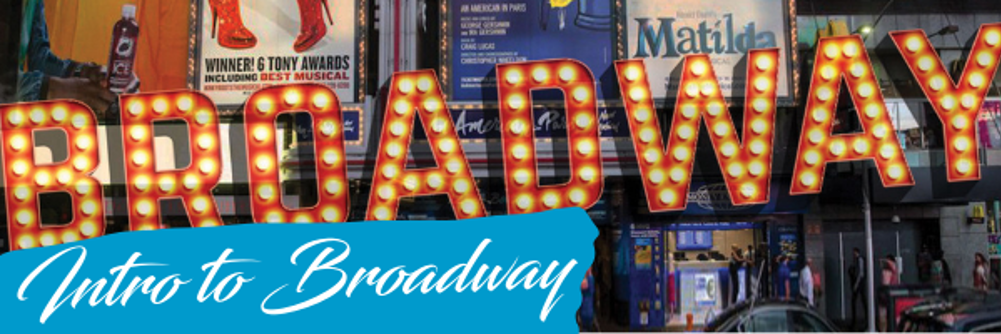
Broadway! For over a century composers, writers, singers, and dancers have flocked from around the world to work in the forty theaters located between 42nd and 57th Streets. Here they meld melodies, lyrics, dance, and stories to create experiences that make us laugh and cry. Often referred to as the Great White Way due to its bright lights, Broadway is renowned internationally as the heart of American musical theatre.
From the early 1890s through the 1920s, Broadway offered audiences the popular musical revue. Much like variety shows, revues combined vaudeville acts, comedic sketches, and musical numbers into one long performance. Lacking unifying story-lines, revues reflected the light-hearted attitudes and frenetic pace of an urbanizing America. In the late 1920s, a few “musical plays” such as Show Boat featured narratives with cohesive plot lines that slowly challenged the dominance of the musical revue. During the Golden Age of Broadway which began shortly after World War II, artists like Rodgers and Hammerstein continued to refine and perfect the “musical play.” Shows like Oklahoma! and My Fair Lady supplanted the revue, as their greater sophistication, production value, and depth appealed to audiences who had survived the hardships of the Great Depression and the Second World War. Whereas these earlier shows often glossed over or winked at serious social problems in the name of “entertainment,” in the 1960s Broadway confronted those issues directly.
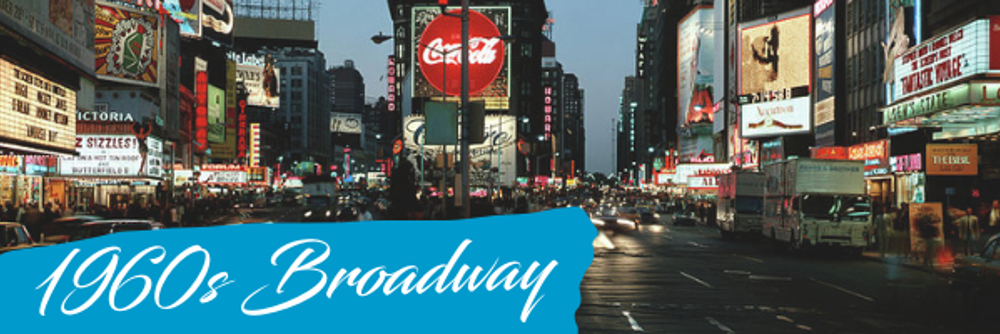
When Oscar Hammerstein II, the lyricist famous for Oklahama!, The Sound of Music, and Show Boat passed away in 1960, a chapter closed on Broadway. Unlike Hammerstein’s celebratory and nostalgic shows of the 1950s, the musicals of the 1960s grew steadily darker as the cultural chaos of the decade subtly influenced their creators. Rising talents like Jerry Herman, Stephen Sondheim, Gower Champion, and Bob Fosse created provocative shows with flawed characters facing realistic challenges. They and others pushed the American musical in new directions that appealed to audiences living through the turmoil of the decade. New stars such as Jerry Orbach, Angela Lansbury, Zero Mostel, Barbra Streisand, and Liza Minnelli emerged to take Broadway, and later, Hollywood, by storm.
As the content of the Broadway musical changed, the sets and staging grew more complex with increased cast sizes and budgets to match. By mid-decade, a musical’s production costs averaged $500,000, decreasing the likelihood that even a well-reviewed show could make a profit. By the end of the decade, Broadway’s cultural influence had also declined. As the popularity of rock and roll music skyrocketed, the number of hits emerging from musicals declined. Less Broadway music found its way onto radio playlists, as it became increasingly more difficult to present songs from musicals as stand-alone hits. Yet even as the national audience of Broadway decreased, as an art form, the musical itself grew in depth, complexity, and execution during the 1960s.
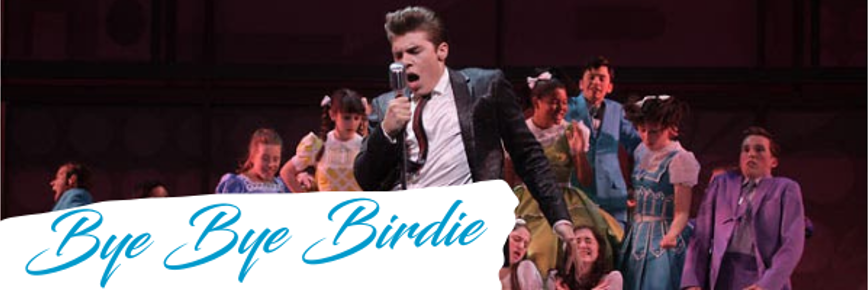
Debuted: April 14, 1960 at the Beck Theatre
Creators: Gower Champion - Director/Choreographer | Lee Adams - Lyrics | Charles Strouse - Composer
Starring: Dick Van Dyke - Albert Peterson | Chita Rivera (Songbook Hall of Fame Honoree) - Rose Alvarez | Paul Lynde - Harry MacAfee
Featured Song: “Put on a Happy Face”
Bye Bye Birdie (film 1963) - "Put on a Happy Face" - Dick Van Dyke and Janet Leigh
The decade began innocently enough with the surprise hit Bye Bye Birdie, a musical comedy that satirized the hysteria surrounding the enlistment of rock and roll heartthrob Elvis Presley in the United States Army. Its cohesive plot and realistic setting followed the examples set by the Rodgers and Hammerstein musicals of the 1950s. Directed and choreographed by the multi-talented Gower Champion, Bye Bye Birdie featured a set design and staging that included no blackouts during scene changes. The practice of utilizing one talented individual as director and choreographer increased in popularity as the decade progressed. Bye Bye Birdie also started a trend toward faster-paced shows in which the musical performances directly advanced the plot rather than breaking the action. The show propelled Dick Van Dyke and Chita Rivera to stardom, and Van Dyke’s solo “Put on a Happy Face” was the hit of the musical.
What Was Happening in America?
March 5, 1960
Elvis leaves Army
November 8, 1960
John F. Kennedy elected
December, 1960
"The Pill" is approved for contraceptive use
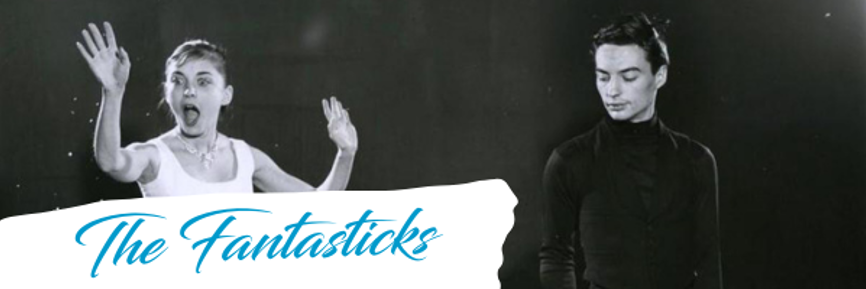
Debuted: May 3, 1960, Opened off-Broadway in the Sullivan Street Theater
Creators: Harvey Schmidt - Composer | Tom Jones - Lyricist
Starring: Jerry Orbach - El Gallo (the Narrator/Bandit) | Rita Gardner - Luisa (The Girl) | Kenneth Nelson - Matt (The Boy)
Featured Song: "Try to Remember"
The Fantasticks (1960) - "Try to Remember" (1982) - Jerry Orbach
A low-budget, off-Broadway musical, The Fantasticks premiered in the tiny Sullivan Street Playhouse in Greenwich Village to mixed reviews and poor audience turnout. Word-of-mouth advertising and national recognition for fledgling actor Jerry Orbach’s rendition of the song “Try to Remember” increased ticket sales, which led to greater acclaim as the show eventually won the Vernon Rice Award for the best off-Broadway musical of that season. Although at one point the show’s backers thought they might lose their meager $16,500 investment, The Fantasticks has become the longest running show in musical history at well over 20,000 performances and counting. The antithesis of the ever increasing numbers of big budget Broadway shows, The Fantasticks included only the “essential” elements of a musical; a small cast backed by a single piano. The simple plot resonated with audiences with its straightforward presentation of a tale of two young lovers who part to see the world only to reunite after discovering they needed each other all along.
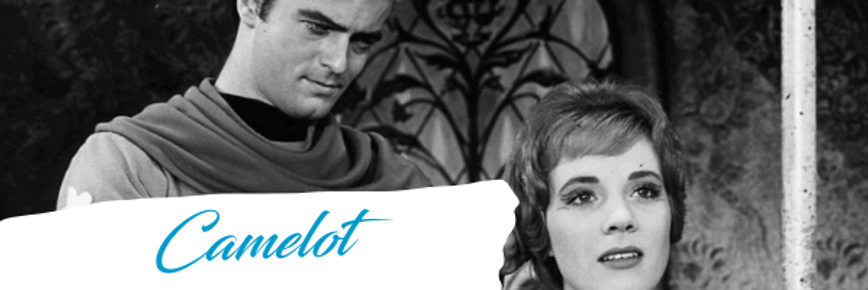
Debuted: December 3, 1960 at the Majestic Theatre
Creators: Alan Jay Lerner and Frederick Loewe - Lyricist, Composer
Starring: Robert Goulet - Sir Lancelot | Roddy McDowall - Mordred | Julie Andrews - Queen Guenevere | Richard Burton - King Arthur
Featured Song: “If Ever I Would Leave You”
Camelot (1960) - "If Ever I Would Leave You" - Robert Goulet
For the famous lyricist and composer super-duo, Alan Jay Lerner and Frederick Loewe, Camelot represented their all-important follow up to their biggest hit of the 1950s, the wildly popular romantic comedy My Fair Lady. Lerner and Loewe turned to T.H. White’s “The Once and Future King” for inspiration, adapting his tale of Arthurian romance and tragedy for the musical stage. Camelot featured a lavish set and two huge stars, Julie Andrews and Richard Burton, as the show’s producers spent over a half-million dollars to bring the story to life. The unprecedented amount foreshadowed the rapid rise in Broadway budgets as musicals continued to grow in complexity and expense. Camelot received mixed reviews as most critics found it inferior to My Fair Lady, yet it enjoyed commercial success and ran for over two years on Broadway. “One brief shining moment,” Lerner’s lyric about Camelot, became forever associated with President Kennedy and his administration after Jackie Kennedy revealed in a post-assassination interview that her husband enjoyed listening to the musical every evening before retiring. This connection, rather than the show itself, may have preserved its legacy.
Learn more about Camelot in Of Thee I Sing: Politics on Stage
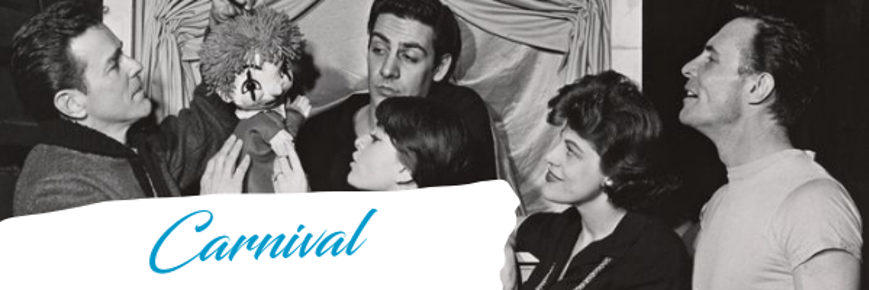
Debuted: April 13, 1961 at the Imperial theater
Creators: Bob Merrill - Composer | Michael Stewart - Librettist | David Merrick - Producer | Gower Champion - Director Choreographer
Starring: Jerry Orbach - Paul Berthalet | Anna Maria Alberghetti - Lili
Featured Song: “Love Makes the World Go Round”
Carnival (1961) - "Love Makes the World Go 'Round" - Anna Maria Alberghetti
The romantic musical Carnival was the first Broadway musical based on a Hollywood film, a recently popular movie titled Lili. Both movie and musical focused on the story of Lili, a young orphan girl adopted by carnival performers. She briefly becomes enamored with the show’s magician, before falling in love with and bringing out the repressed goodness of a lame, misanthropic puppeteer played by Jerry Orbach. The original score by composer Michael Stewart and librettist David Merrick produced only one hit, “Love Makes the World Go Round.” Carnival, however, further advanced set design and contained innovative moments of audience interaction overseen by its director, Gower Champion. The show featured real circus performers and actors who entered, exited, and sang amidst the audience. Also Champion chose not use a curtain in order to allow the audience to see the “carnival” being set up on stage as they entered the theatre. Carnival reached over 700 performances, demonstrating that a talented director could transform an average score and book into a Broadway success.
What Was Happening in America?
April 16-25, 1961
Bay of Pigs Invasion
May 4, 1961
"Freedom Riders left D.C.
May 25, 1961
JFK inaugurated "space race" in response to Soviets
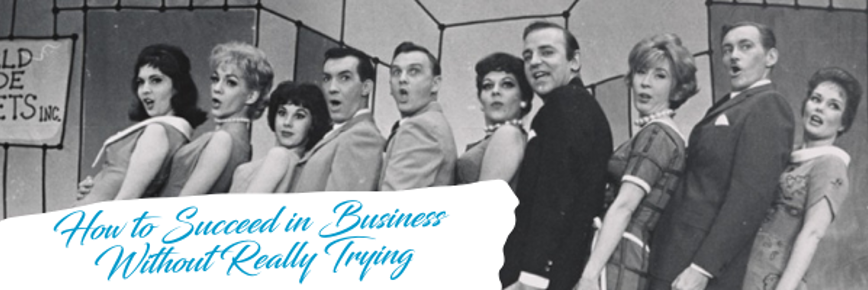
Debuted: October 14, 1961 at the 46th Street Theatre
Creators: Feuer and Martin - Producers | Frank Loesser - Composer
Starring: Robert Morse - J. Pierrepont Finch | Bonnie Scott - Rosemary Pilkington | Charles Nelson Reilly - Bud Frup | Rudy Vallée - J.B. Biggley
Featured Song: “I Believe in You”
How to Succeed in Business Without Really Trying (film 1967) - "I Believe in You" - Michele Lee and Robert Morse
With a successful run of 1,416 performances, How to Succeed in Business Without Really Trying represented the gradual content shift of the American Musical from the lighthearted subject matter of the previous decade to more sophisticated fare. Based on the 1952 book of the same name, the show satirized American business life and culture. Most musical comedies up to this point focused on some sort of unlikely romance, but in this show the love story between window-washing corporate climber J. Pierrepont Finch and pretty secretary, Rosemary Pilkington, played a completely secondary role in the plot. In fact, composer Frank Loesser’s best songs, such as “I Believe in You”, that Pierrepont lovingly sings to himself in the bathroom mirror, played up the satire instead of the romance. Clever production and superb casting complemented Loesser’s caustic songs, and earned the show a Pulitzer Prize in addition to its commercial success.
What Was Happening in America?
December, 1961
U.S. increased presence in Vietnam
October 22-28, 1962
Cuban Missile Crisis
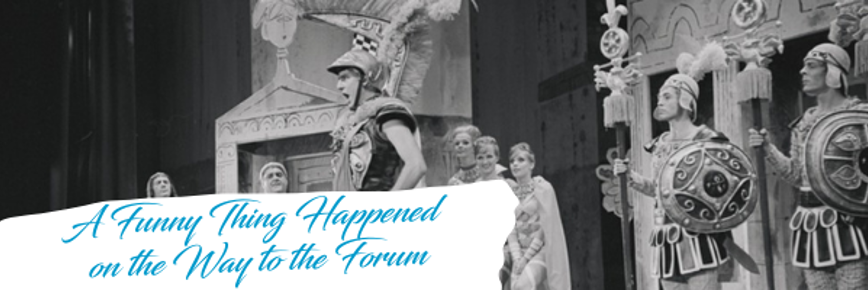
Debuted: May 8, 1962 at the Alvin Theatre
Creator: Stephen Sondheim - Composer, Lyricist
Starring: Zero Mostel - Prologus/Pseudolus | Brian Davies - Hero | Preshy Marker - Phila
Featured Song: "Comedy Tonight"
A Funny Thing Happened on the Way to the Forum (1962) - "Comedy Tonight" - Zero Mostel
In A Funny Thing Happened on the Way to the Forum, Zero Mostel played a slave offered his freedom in exchange for procuring a beautiful and vapid courtesan, a mission that results in a Marx Brothers’-like comedy of errors. The satirical musical, inspired by the farces of ancient Roman playwright Plautus, included puns, cases of mistaken identity, and comments on social class. Stephen Sondheim, in his first effort at writing both music and lyrics for a musical, created a compelling and clever score that gave A Funny Thing Happened on the Way to the Forum a depth not normally found in a supposedly “light” comedy. The zany show with one of the funniest scripts of the decade ran for over two years at the Alvin Theatre and earned several Tony awards.
What Was Happening in America?
August 5, 1962
Marilyn Monroe died
1963
Feminine Mystique published
August 28, 1963
Martin Luther King, Jr. delivered "I Have a Dream" speech
November 22, 1963
JFK assassinated

Debuted: September 22, 1964 at the Imperial Theater
Creators: Jerome Robbins - Director | Jerry Bock - Composer | Joseph Stein - Book | Sheldon Harnick - Lyrics
Starring: Zero Mostel - Tevye | Maria Karnilva - Golde | Joanna Merlin - Tzeitel | Julia Migenes - Hodel
Featured Song: "Tradition"
Fiddler on the Roof (film 1971) - "Tradition!" - Chaim Topol
No other musical reflected the cultural changes occurring outside the theatre better than Fiddler on the Roof. Set in 1905 Tsarist Russia and based on the short stories of Sholom Aleichem, Fiddler told the story of a milkman, Tevye, as he coped with challenges to his faith and traditional way of life. Fiddler explored the mature themes of discrimination, oppression, displacement, and ultimately, survival. Tony Award-winner Jerry Bock composed the enduring score that includes now classic songs “Tradition,” “If I Were a Rich Man,” “Matchmaker”, and “Sunrise, Sunset”. A new style of rotating set allowed scene changes while the action continued onstage. Zero Mostel, as Tevye, tied the show together by finding the perfect mix of comedy, drama, and poignance. Fiddler on the Roof set a record as the first Broadway show to run for more than 3,000 performances and has become one of the most popular musicals in Broadway history due to its impactful tale of hope amidst life-altering change.
What Was Happening in America?
February 9, 1964
Beatles appeared on Sullivan, attracting 70 million viewers
July 2, 1964
Civil Rights Act
July 2, 1964
Civil Rights Act
October 14, 1964
MLK won Nobel Peach Prize

Debuted: November 22, 1965 at a temporary theatre on New York University campus, then briefly at Lincoln Center
Creators: Joe Darion - Lyrics | Mitch Leigh - Composer
Starring: Richard Kiley - Don Quixote | Irving Jacobson - Sancho | Joan Diener - Aldonza
Featured Song: "The Impossible Dream"
Man of La Mancha (1965) - "The Impossible Dream" - Richard Kiley (1972 Tony Awards)
One of the most poignant musicals of the decade, Man of La Mancha confronted totalitarianism, wrongful persecution, violence, and rape, and asked the question, “Is it better to see the world as it truly is, or how we wish it was?” On its face the musical dramatically interpreted the novel “Don Quixote”, but in reality told the story of Don Quixote’s author, Miguel de Cervantes. Awaiting trial during the Spanish Inquisition, the author portrayed the idealistic dreamer Don Quixote in order to save his possessions, and possibly his own life, from his fellow prisoners. The tremendous score included the inspirational piece “The Impossible Dream,” and “The Wild Wind of Fortune.” Audiences connected deeply with Don Quixote’s emotional struggle to create his own reality, no matter the dangers lurking around him. The show ran for 2,328 performances enjoying two revivals and several stage adaptations.
What Was Happening in America?
June 8, 1965
American troops on offensive in Vietnam
August 6, 1965
Voting Rights Act passed
August 11, 1965
Watts Race Riots began
September 5, 1965
Michael Fallen introduced the word "hippie" in San Francisco Examiner

Debuted: November 20, 1966 at the Broadhurst
Creators: Joe Masteroff - Book | Fred Ebb - Lyrics | John Kander - Composer
Starring: Joel Grey - The Emcee | Jill Haworth - Sally Bowles | Bert Convy - Clifford Bradshaw | Lotte Lenya - Fräulein Schneider
Featured Song: "Wilkommen"
Cabaret (1966) - "Wilkommen' - Joel Grey and the Original Cast
The quintessential 1960s musical, Cabaret represented the culmination of Broadway’s move towards confronting mature subject matter on stage. Although based on a 1930’s novel by Christopher Isherwood, the inspiration for the musical came from a Life magazine photo showing a group of “Aryan, Nazi boys snarling at a little black girl” in Chicago. Director Hal Prince contended that “wherever human beings are, terrible things can happen”. Cabaret told the story of the rise of fascism in Germany as experienced by the performers in a Berlin cabaret, known as the Kit Kat Club. The show explored in a straight-forward manner provocative themes such as Nazism, abortion, prostitution, and sexual decadence. The show’s sophisticated, non-linear staging presented the audience with two musicals on the same stage; one depicted the rise of Nazism in Germany while the other took place inside the Kit Kat Club cabaret. The songs performed in the club commented on the action but did not drive the plot until one of the main characters, Sally Bowles, steps from one musical into the other. Wildly innovative, Cabaret has become a Broadway classic with many critics and historians declaring it the most important musical of the decade.
Learn more about Cabaret in Of Thee I Sing: Politics on Stage
What Was Happening in America?
October 15, 1966
Black Panther Party founded
December, 1966
MLK opposed war
Summer, 1967
Summer of Love
November 9, 1967
Rolling Stone magazine premiered
December 31, 1967
385,300 troops in Vietnam

Debuted: April 29, 1968 at the Biltmore after playing off-Broadway briefly
Creators: Galt MacDermot - Composer | Gerome Ragni and James Rado - Lyrics
Starring:
Featured Song: "Hair"
Hair emerged as one of the most important shows of the decade by redefining the type of musicals that were considered acceptable and commercially viable on Broadway. A series of vignettes with no cohesive plot, Hair followed the exploits of the “tribe,” a group of hippies and rebels who confronted social problems relating to racial inequality, drugs, homosexuality, poverty, and the Sexual Revolution as those problems arose throughout the musical. The “tribe” faced them through songs that drew heavily from the protest culture of the 1960s, with each performance promoting the ideas of sexual liberation, racial equality, and drug use. Hair also contained the now infamous nude scene during the song “Where Do I Go?” - a strong sign the sexual revolution had arrived on Broadway. The rock rhythms that permeated songs like “Where do I Go,” “Aquarius,” and “Good Morning Starshine” made Hair the first “rock musical,” and paved the way for shows like Jesus Christ Superstar, Godspell, and Grease that followed in the 1970s. Hair ran 1,844 performances on Broadway and toured extensively throughout the United States and Europe.
Learn more about Hair in Of Thee I Sing: Politics on Stage
What Was Happening in America?
April 4, 1968
Martin Luther King, Jr. assassinated
November 5, 1968
Shirley Chisholm elected to Congress
June 27, 1969
Stonewall riots
July 20, 1969
Moon landing
August 15-17, 1969
Woodstock drew 400,000 attendees



